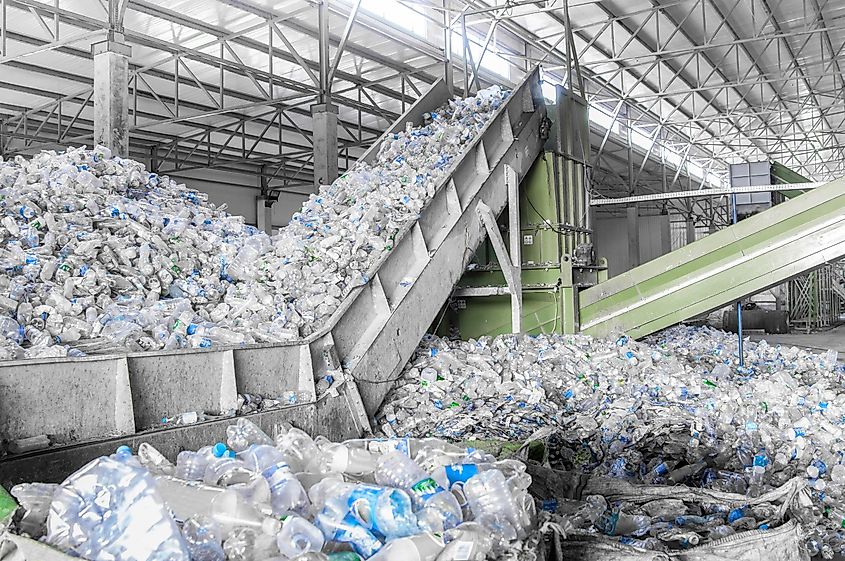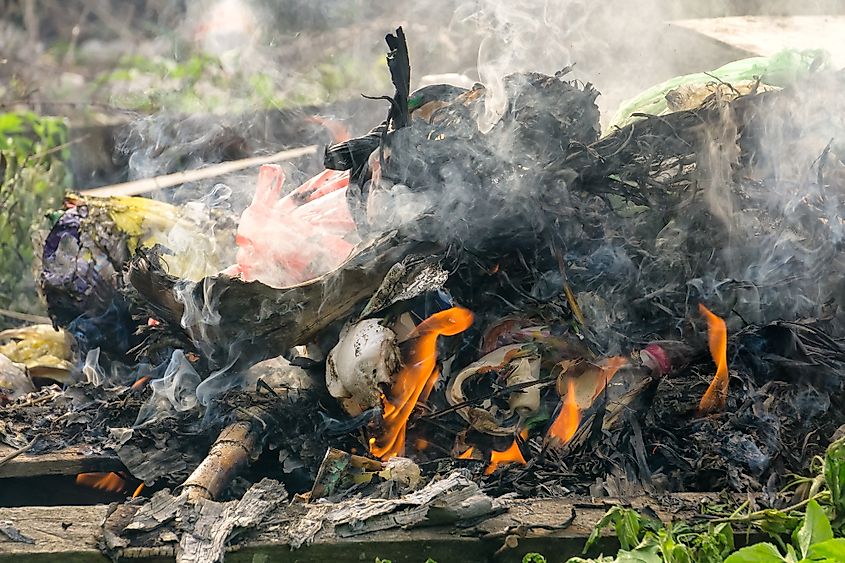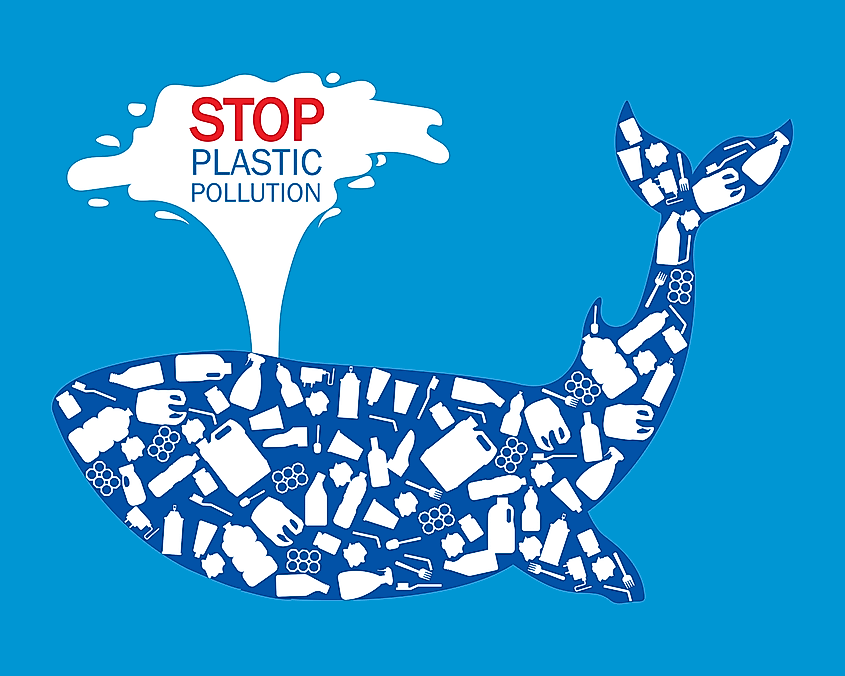Additionally, rather than decreasing, plastic production is doubling every 11 years or so, meaning the problem of plastic waste is growing. The richest nations, not surprisingly, are producing the highest levels of plastic, and the issue of waste has been directly correlated with wealth.
Countries Producing The Most Plastic Waste
The country which produces the most waste is the United States. Second, is the United Kingdom. Americans produce on average 105 kg of waste per capita, per year, while the figure stands at 98.66 kg for the United Kingdom. These staggering numbers show the extreme levels of plastic waste that are thrown out each year. All of this plastic, which generally has an extremely long shelf life, is left to pile up in garbage dumps, or accumulate in the world’s oceans, creating a bigger and bigger waste problem throughout the world.
| Rank | Country | Plastic waste per capita kilograms per year |
| 1 | United States | 105.3 |
| 2 | United Kingdom | 98.66 |
| 3 | South Korea | 88.09 |
| 4 | Germany | 81.16 |
| 5 | Thailand | 69.54 |
| 6 | Malaysia | 67.09 |
| 7 | Argentina | 60.95 |
| 8 | Russia | 58.66 |
| 9 | Italy | 55.51 |
| 10 | Brazil | 51.78 |
Following these two countries are South Korea and Germany, similarly wealthy countries that generate large amounts of plastic waste. Together, the world produces roughly 300 million tons of plastic each year, and authorities are simply running out of ‘safe’ places to put it. Of these 300 million tons, an estimated 8.8 million end up in the ocean, according to a 2015 study titled Plastic Waste Inputs From Land into the Ocean, by JENNA R. JAMBECK et. al.
These wealthiest countries and global economic leaders have little to no incentive to quit using plastic (at least when viewed from a financial point of view). Though programs exist to deter consumers from buying or using one-time use plastics, it is almost impossible to avoid using plastics of some kind in day to day life, simply due to the sheer volume and depth of integration plastics have made into the world’s systems. These giants such as the United States, the United Kingdom, Germany and South Korea use plastics for their ease, cheapness, and convenience, and until plastic use changes at a systemic level, it will be very difficult for average people and consumers to completely eliminate it from their lives.
The other top ten countries producing the most plastic waste include Thailand, Malaysia, Argentina, Russia, Italy and Brazil. Each of these countries is a wealthy power whose systems or consumer product partnerships promote the continued use of plastics in a variety of sectors.
Countries Leading In Plastic Production
While the United States and the United Kingdom produce the most waste, it is worth noting that China is the number one producer of the plastic (that is to say, not waste, but plastic for first-time use). While not meant to point a finger directly at China, who waste considertably less plastic, this information is important in understanding the complex and global nature of the plastic waste crisis.
Waste cannot be isolated to one area, or one nation, as the emissions and environmental impacts of this plastic are widespread, and have ripple effects all over the world. Though waste may be produced in the United States, if this waste finds its way into the sea, it very quickly becomes a global problem, contaminating fish in the open ocean with microplastics, or polluting natural ocean habitats. The nature of our world and our ecosystems are such that pollution in one area will eventually spread to another area, and decrease the overall health of the planet as a whole.
Without the production of the plastic in China, the United Kingdom would not have as much plastic to waste, but without the demand from global leaders such as the United States, China would not have the need to produce as much, etc. In this way, all aspects of the plastic industry and economy are linked, and have effects on the wider world.
The Recycling Issue

One of the most misunderstood systems, especially in relation to plastic waste reduction, is recycling. Generally speaking, it is thought that excess plastic can simply be recycled, and the issue of waste all but eliminated. This is sadly not the case.
U.K.-based lecturer in international relations at Cardiff University’s School of Law and Politics Jennifer Allan notes that despite producing hundreds of millions of tons of plastic, only about 9% of that is successfully recycled. This means that there are still hundreds of billions of tons of plastic which cannot or will not be remade into anything else, and instead simply remain as waste until their eventual breakdown. Recycling, essentially, is just not worth it. Plastics are so diverse and different, that though metals and glass can simply be repurposed, plastics must be sorted through a sometimes difficult and usually radius process. Even then, once sorted, the plastics aren;t always useful, can be difficult to recycle, and have very few uses for second-time use. There is very little demand for recycled plastic, and the cost of recycling is simply not worth it for most companies and global economies. Thus, the plastics remain. The world is, in the most basic sense, producing and disposing of too much plastic too quickly for any reasonable or current recycle system can practically handle.
Exportation

When plastics can’t be recycled, and wealthy countries do not want to deal with the plastic waste, it is more often than not shipped ‘elsewhere’ to become someone else’s problem. This is in part why despite these major countries being the biggest consumers of plastic, it may not appear that they have the most waste. Roughly half of the waste produced by the United Kingdom is exported to other countries, such as Vietnam and Turkey (and formerly Malaysia). These less wealthy countries would take the plastic waste for a fee, seemingly removing the problem from the global power countries, but not eliminating it from the world’s environment.
Burning Plastic Waste

Another common way to remove plastic is by burning it. This seems effective, as it does eliminate the initial plastic problem, however the fumes produced by such burning can be toxic, and/or harmful to the environment, and the continued release of these plastic fumes is likely to have a negative effect on the environmental health of our world.
Making Changes

Some countries, though, are fighting against this extreme use of plastic with varying success. Ultimately, though recycling programs can work, to a point, the core of the problem is the sheer volume of plastic used – not only in these ten countries – but around the world. From producers of the plastic, to companies that buy it, use it in their packaging, etc., our world has become reliant on plastic. Without shifting this reliance, and examining new ways to avoid overusing it at the systemic level, more and more tons of waste will be produced, with less and less place to put it.
Adjusting our ways isn’t simply a consumer problem – in fact, consumers barely scratch the surface of helping to reduce plastic use. It is up to large corporations, and governments to adjust their uses and find new ways to move forward, with less plastic from the start, in order to reduce the waste levels around the world.


 Users Today : 680
Users Today : 680 Total views : 464437
Total views : 464437